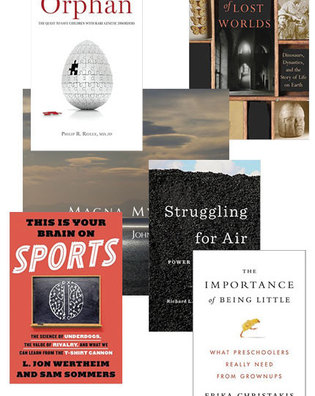 loading
loading
Arts & CultureOutputTo have your book, music, film, app, or other work considered for Output, please send a copy to Arts Editor, Yale Alumni Magazine, PO Box 1905, New Haven CT 06509; or e-mail a copy or link to yam@yale.edu.  View full imageHouse of Lost Worlds: Dinosaurs, Dynasties, and the Story of Life on Earth In 1866, financier George Peabody gave Yale $150,000 for a natural history museum. After 150 years, there are many tales to tell, and veteran science writer Conniff has told several in this magazine: the waterbug collector who reinvented ecology; the paleontologist who realized birds had evolved from dinosaurs; how a lawyer brought science to Yale. These and other stories are woven together for a fascinating exploration of the museum’s history and contribution to “our sense of wonder.” You hurl yourself over a railing to catch a cheap team T-shirt shot out of an air cannon . . . boo confessed steroid abuser Alex Rodriguez but excuse the same behavior in, say, Manny Ramirez . . . root for a team never likely to win. Crazy? Sportswriter Wertheim and psychologist Sommers argue that the appearance of lunacy in sports is “rooted in basic human psychology, neuroscience, and cognitive tendency.” They’ll bet you a “chest-hair sandwich” they’re right. The “war on coal” charge that has dogged the Obama administration is a myth, write legal scholars Revesz and Lienke. In a clear-headed history, they examine the often bitter battles that took place as presidents from both parties, the EPA, and the courts have tried to deal with a provision in the 1970 Clean Air Act—its “tragic flaw”—that allowed old coal-fired power plants to keep operating, causing “too much harm to too many Americans for far too long.”
“The important thing about young children is that they are powerful,” says Christakis, a certified teacher for pre-K through second grade and a researcher on early childhood. In this look at the state of preschool education—some of it drawn from experiences at the Calvin Hill Day Care Center in New Haven—she offers a prescription to help these “little superheroes streaking across the sky” become better learners. This process starts, Christakis explains, with adults helping “young children be young children” by “getting out of the way.”
Commissioned to mark the completion of a years-long restoration of Trinity Cathedral in South Carolina, Magna Mysteria (“Great Mysteries”) is as much about missing one’s spiritual home as it is about regaining it. The seven-movement, 45-minute opus is studded with quotes from Boethius and the Bible and performed by two choirs (adults and children), a chamber orchestra, and transcendent soprano vocalist Martha Guth. A forthright, soaring, sonorous work, it sometimes trembles with awe at the sheer magnitude of what it is trying to convey. Physician Reilly has treated patients afflicted by “a bad ticket in life’s genetic lottery.” In this hopeful yet heartbreaking book, Reilly—now a venture capitalist funding biotech start-ups—introduces us to researchers seeking therapies for relatively uncommon diseases: cystic fibrosis, phenylketonuria, Rett syndrome, more. We also meet the parents, who are “among the great, unsung heroes of our world.”
The comment period has expired.
|
|